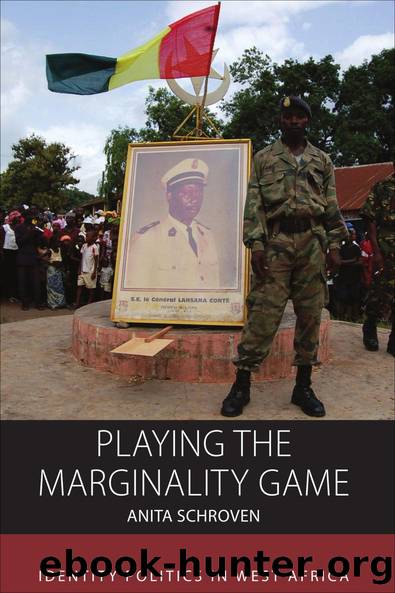Playing the Marginality Game by Anita Schroven

Author:Anita Schroven [Schroven, Anita]
Language: eng
Format: epub
ISBN: 9781789201895
Barnesnoble:
Publisher: Berghahn Books, Incorporated
Published: 2019-03-27T00:00:00+00:00
Map 3.1 Development poles in Forécariah prefecture.
While the secretaryâs comments reflected doubts about the feasibility of the prefectâs idea to copy the project in Forécariah, they also highlighted the ideas that have been expressed within the international discourse of democratic decentralization. Shared history in rural settings is usually emphasized to bring about solidarity and thus increase chances for collective action. The origin of the names reflects a mixture of pre-colonial (Moria, Benna) and colonial (Méllacorée, Kimambourou) political entities. The intended historic references are very different. Moria and Benna constituted pre-colonial principalities. Méllacorée was the name of the first French cercle in the region, with Benty as its headquarters. The cercle was later enlarged and renamed Forécariah. Kimambourou was a canton that existed for a few years around 1912.
While the regional references Kimambourou and Méllacorée are no longer in everyday use, the others can be heard in everyday conversations to designate regional identities, even without any particular historic reference. The depth of historic reference thus differs widely in the four envisioned development poles. As the secretary hinted above, a strong historic reference and shared (historic) identity may not be helpful. It may even be counterproductive for the kind of solidarity and trust the development-pole project would imply. This at least had been the experience of colonial and post-colonial administrators before this current team. They had re-drawn administrative boundaries with exactly this aim: making people more easily governable, making them pay their taxes, integrating them more into the larger political entity that was Guinea. The highly motivated ideas of the prefect, of the UNâs PDLG and of many countries currently re-drawing internal boundaries in order to better adapt administration to the people, in order to make them feel more integrated, all face history and the failures that their similarly motivated predecessors produced. Ethiopia is one such example of re-drawn boundaries that should ideally reflect the ethnic origins of the populations living there. This has, however, resulted in further discrimination of those people who suddenly find themselves in the minority in a given area, now that the borderers have moved. Democratic representation, an ideal of many of these reforms, was not achieved. Neither were cohesion and social peace improved.
It was this project that initiated a series of activities in Forécariah. A national NGO collaborated with the prefectâs staff to organize workshops that would unite representatives of CRDs in accordance with the envisioned development poles. These workshops were expected to enforce councillorsâ capacities as elected representatives and encourage their future cooperation in collective development projects. In accordance with the prefectâs wishes, this initiative was to further local solidarity and democratic understanding, as the prefect explained:
I want to make a point here for progress, for development, for modernity. Democratic elections, representative democracy, these are new things for people here. How are the councillors supposed to know? But the local solidarity that has been here all throughout, this is where we are going to start and turn it into something contemporary . . . I want
Download
This site does not store any files on its server. We only index and link to content provided by other sites. Please contact the content providers to delete copyright contents if any and email us, we'll remove relevant links or contents immediately.
The Secret History by Donna Tartt(19092)
The Social Justice Warrior Handbook by Lisa De Pasquale(12191)
Thirteen Reasons Why by Jay Asher(8912)
This Is How You Lose Her by Junot Diaz(6889)
Weapons of Math Destruction by Cathy O'Neil(6281)
Zero to One by Peter Thiel(5802)
Beartown by Fredrik Backman(5756)
The Myth of the Strong Leader by Archie Brown(5509)
The Fire Next Time by James Baldwin(5448)
How Democracies Die by Steven Levitsky & Daniel Ziblatt(5219)
Promise Me, Dad by Joe Biden(5154)
Stone's Rules by Roger Stone(5088)
A Higher Loyalty: Truth, Lies, and Leadership by James Comey(4964)
100 Deadly Skills by Clint Emerson(4927)
Rise and Kill First by Ronen Bergman(4790)
Secrecy World by Jake Bernstein(4753)
The David Icke Guide to the Global Conspiracy (and how to end it) by David Icke(4720)
The Farm by Tom Rob Smith(4514)
The Doomsday Machine by Daniel Ellsberg(4490)
